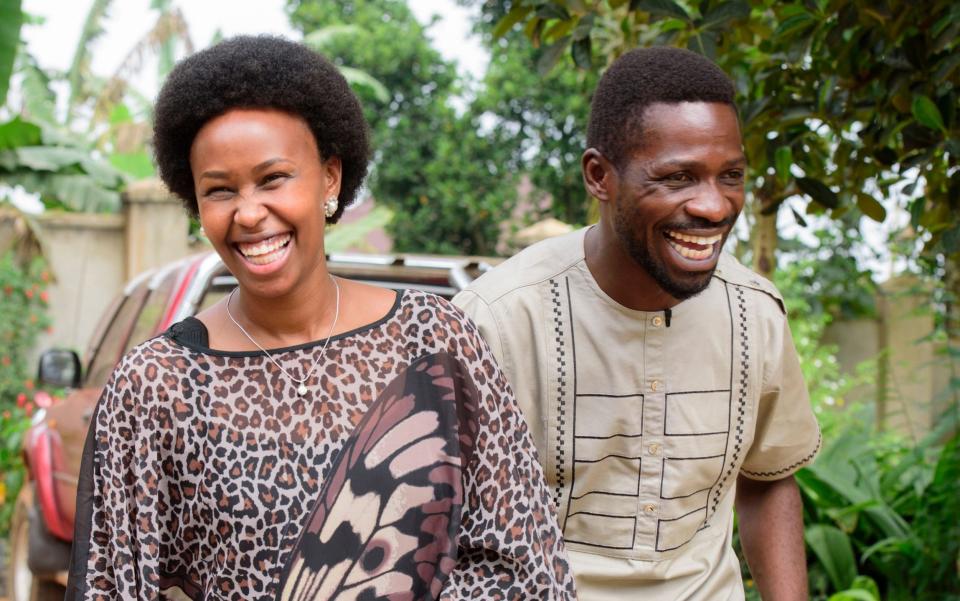Uganda goes to the polls after bloody eight-week election campaign

Ugandans voted in presidential elections on Thursday during an unprecedented internet shutdown following a bloody eight-week campaign that pitted long--time president Yoweri Museveni against youthful popstar-turned-politician Bobi Wine.
The turnout was up across the capital, Kampala, according to election officials at polling stations, with long queues forming in the morning and many first-time voters waiting up to two hours to cast their ballot
On Wednesday the government communications regulator ordered all internet service providers to immediately implement a "temporary suspension of operations" until further directed, according to a letter seen by The Telegraph, plunging the country into an unprecedented information blackout just 12 hours before polls opened in the most contentious election of Mr Museveni's 35-year reign
Presidential candidate Bobi Wine, whose real name is Robert Kyagulanyi, told reporters at his home before he went to vote: "This is one of the many efforts that General Museveni is doing to ensure that Uganda is kept in the dark and the world is kept in the dark about Uganda."
Mr Museveni, who seized power as the head of a rebel army in 1986, is seeking a sixth term in office but appears to have been caught off guard by the popularity of Mr Wine, who early in his music career had cultivated a bad-boy image.
In the week ahead of the vote, columns of newly purchased armoured personnel carriers rolled through the streets of Kampala and military helicopters buzzed low across the city, the downdraft from the rotors shaking city center tree branches.

An unmanned aerial vehicle circled over the city in the nights ahead of the polls. On the eve of the vote the US ambassador to Uganda, Natalie Brown, announced the US would not take part in an already very limited electoral observer mission because so few embassy officials had received accreditation to monitor polls.
Limited UK and EU observer missions went ahead.
Although voting passed largely without incident in Kampala, Mr Wine said that in rural areas security forces had arrested polling agents and coordinators from his National Unity Platform (NUP) party.
He said: "In 22 districts our teams are on the run because they are being surrounded by police and soldiers as if they are criminals."
An hour before polls closed police raided a central Kampala hotel where a local civil society organisation, the National NGO Forum, had organised a data-collection centre to monitor voting irregularities. Police accused the organisers of National NGO Forum of operating a "parallel tally centre" and arresting about 30 NGO workers, according to one staff member who escaped the scene and spoke to The Telegraph on condition of anonymity.
As the polls closed in one low-income neighbourhood in the shadow of Kampala's main hospital, a crowd watched a presiding officer count ballots.
A cheer went up from the crowd each time a vote was allocated to Mr Wine while they jeered and groaned in disappointment at every vote for Mr Museveni.
"We don't trust the system, we want to see with our own eyes so they don't cheat," said James Okiru, 28, a cleaner.
"Kyagulanyi will surely win if the votes are counted fairly."
However, in Mr Wine's heartland of the Kamwokya slum, Mohammed Bukunya, 55, did not share his neighbours' youthful enthusiasm.
'There are some young boys and girls who jump all day, they shout and make noise, it's because they don't know what they are doing," he said on his way to cast his vote.
Mr Museveni is still held in high regard by much of Uganda's older generation, who remember him returning stability to the country after helping to oust dictator Idi Amin.
The 76-year-old president voted in his home district of Kiruhura in rural western Uganda, about 155 miles from the capital.

"He is sure of winning, but he will accept the result of the election so long as they are free and fair," Don Wanyama, a spokesman for president Museveni, told AFP.
The run-up to polling day was marred by a sustained crackdown on Mr Museveni's rivals and government critics, and unprecedented attacks on the nation's media and human-rights defenders.
In November, at least 54 people were shot dead by security forces loyal to Mr Museveni during protests against one of Mr Wine's numerous arrests.
Electoral commission chief Justice Simon Byabakama admitted on Thursdaythere were glitches with biometric voting systems, but said everyone had still been able to cast their ballot.
Most observers expect Mr Museveni and his ruling National Resistance Movement will emerge victorious.
The results are expected by Saturday at 4pm.
Some 17 million of Uganda's 45 million citizens are registered voters and the winning candidate must secure more than 50 per cent of the vote to avoid a run-off.
Mr Wine has vowed non-violent street protests should Ugandans feel the election was stolen, while Mr Museveni has countered that any violent action will amount to "treason".

